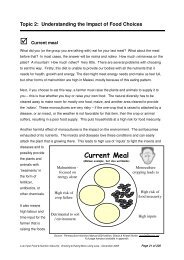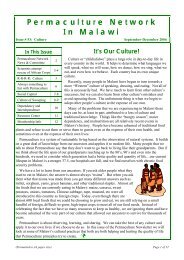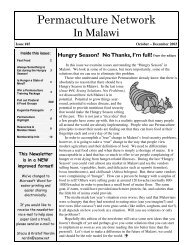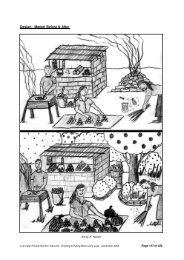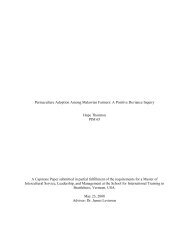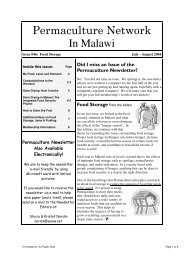Harmonisation of seed laws in Africa.indd - Never Ending Food
Harmonisation of seed laws in Africa.indd - Never Ending Food
Harmonisation of seed laws in Africa.indd - Never Ending Food
Create successful ePaper yourself
Turn your PDF publications into a flip-book with our unique Google optimized e-Paper software.
GRICULTURE, ENERGY AND LIVELIHOOD SERIES<br />
livelihood and culture, not only <strong>in</strong> Europe and the USA but also <strong>in</strong> places like Bolivia, Moldova,<br />
Uzbekistan and Vietnam, for no better reason.<br />
Loss <strong>of</strong> genetic diversity<br />
Because <strong>of</strong> the commercial value <strong>of</strong> hybrids and IP protected <strong>seed</strong>, these are promoted at the<br />
expense <strong>of</strong> local crop diversity, result<strong>in</strong>g <strong>in</strong> mono-cropp<strong>in</strong>g <strong>of</strong> a narrow range <strong>of</strong> crops. This has<br />
resulted <strong>in</strong> a huge loss <strong>of</strong> important genetic material and <strong>in</strong>digenous knowledge systems. It is<br />
estimated that, globally, we have lost 90 - 95 per cent <strong>of</strong> farmers’ varieties over the last 100 years<br />
and that the rate <strong>of</strong> loss is 2 per cent per year. 111 This biodiversity loss has had a big impact on<br />
farmers’ resilience, because hybrid <strong>seed</strong> programmes are seldom susta<strong>in</strong>able and then farmers have<br />
little to fall back on.<br />
Genetic diversity can only evolve and adapt <strong>in</strong> situ<br />
Seed is a liv<strong>in</strong>g organism and responds to its environment. Farmers have, for centuries, used these<br />
adaptive responses <strong>of</strong> <strong>seed</strong>, to select and breed the best varieties. Furthermore, it is because <strong>of</strong><br />
farmers grow<strong>in</strong>g <strong>seed</strong> <strong>in</strong> environments where wider genetic diversity still exists <strong>in</strong> the form <strong>of</strong> wild<br />
relatives and other plants, that plants can acquire the genetic diversity needed for adaptation. In<br />
Southwest Ch<strong>in</strong>a, a comparative analysis has shown that <strong>in</strong> situ varieties have shown much higher<br />
genetic diversity than those same l<strong>in</strong>es held ex situ for 30 years. 112<br />
Agrobiodiversity is critical for climate change adaptation<br />
Despite the claims for a successful Green Revolution <strong>in</strong> Ch<strong>in</strong>a, more than half the households <strong>in</strong><br />
an International Institute for Environment and Development (IIED) survey still use local landraces<br />
<strong>of</strong> rice and maize because they prefer the taste and these <strong>seed</strong>s are better adapted to their<br />
environment. 113 Dur<strong>in</strong>g the 2010 drought <strong>in</strong> the Guangxi prov<strong>in</strong>ce, farmer-improved varieties<br />
survived while most <strong>of</strong> the new hybrid varieties were lost. 114<br />
The loss <strong>of</strong> culture and mean<strong>in</strong>g<br />
Indigenous people and traditional farm<strong>in</strong>g communities put a high value on their <strong>seed</strong>s, because<br />
they understand the connection it br<strong>in</strong>gs to their ancestors and the key role it plays <strong>in</strong> their culture,<br />
health and nutrition. ‘Our <strong>seed</strong>s; our maize, is the basis <strong>of</strong> the food sovereignty <strong>of</strong> our communities.<br />
It’s much more than a food, it’s part <strong>of</strong> what we consider sacred, our present and future.’ 115<br />
Embedded <strong>in</strong> the cycle <strong>of</strong> the <strong>seed</strong>, are the community cycles, cultural celebrations, sacred rituals<br />
and identity <strong>of</strong> thousands <strong>of</strong> communities around the globe. The cycles <strong>of</strong> plant<strong>in</strong>g, harvest<strong>in</strong>g,<br />
exchang<strong>in</strong>g, shar<strong>in</strong>g and celebrat<strong>in</strong>g have many benefits beyond provid<strong>in</strong>g food: they play a vital<br />
role <strong>in</strong> identity and community cohesion. Indigenous people and traditional farm<strong>in</strong>g communities<br />
consider themselves as stewards <strong>of</strong> the future and grow their own varieties <strong>in</strong> harmony with<br />
nature, as these need no chemicals. In this way they say ‘we are guardians <strong>of</strong> the <strong>in</strong>digenous<br />
knowledge passed down from our ancestors from generation to generation and we reaffirm our<br />
responsibility to protect and perpetuate this knowledge for the benefit <strong>of</strong> our peoples and our<br />
future generations.’ 116<br />
Therefore, the ownership <strong>of</strong> <strong>seed</strong> is a foreign concept to them: a theft, because <strong>seed</strong> is sacred and<br />
meant to be shared, impossible to own, as it belongs to all people.<br />
<strong>Harmonisation</strong> <strong>of</strong> <strong>Africa</strong>’s <strong>seed</strong>s <strong>laws</strong>: a recipe for disaster 35



